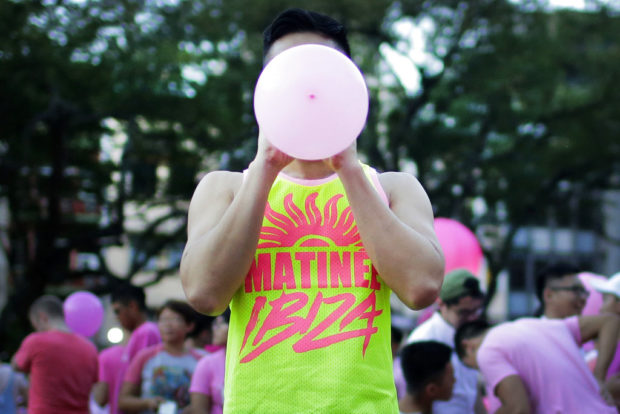
In this July 1, 2017 file photo, a participant blows a pink balloon at a park where thousands gathered for the annual Pink Dot gay pride event in Singapore. AP
SINGAPORE — A Singaporean disc jockey is challenging a law that bans sex between men, a holdover from British colonial days that conservatives insist on keeping but authorities have promised not to enforce.
The case brought this week by Johnson Ong, whose stage name is DJ Big Kid, is the first against the anti-gay law since an appeal by three people was thrown out by the Supreme Court in 2014.
The law, known as Section 377A, states that acts of “gross indecency” between men are punishable with a jail term of up to two years.
Homosexuality is quietly tolerated in Singapore. However, discrimination remains rife, although it is often subtle and masked under the need to protect a pro-family Asian culture.
Singapore’s leaders have said they will not enforce Section 377A, but have been reluctant to remove it from the books for fear of angering conservatives.
This uncomfortable balance was rattled last Thursday, when India’s Supreme Court struck down a British colonial-era law that made intercourse between members of the same sex punishable.
The judges held that sexual orientation was a “biological phenomenon” and that discrimination on that basis violated fundamental rights.
Ong said Wednesday that the Singapore law has weighed on his relationship with his family.
“Though they love me and treat my partner with respect, they do not accept my homosexuality, so our relationship is constantly strained, and I am not able to completely share my life, struggles or successes with them,” Ong said in an interview.
“I am considered a criminal in the eyes of the law and that is an emotional and psychological burden that I carry around as I go through life that no heterosexual Singaporean has to.”
Ong will be represented by lawyer Eugene Thuraisingam, who filed the case on Monday. Thuraisingam said he aims to prove the law violates human dignity.
He said he will also present expert evidence that shows “sexual orientation is unchangeable or suppressible at unacceptable personal cost.” A pre-trial conference has been set for Sept. 25.
Singapore’s leaders have long emphasized that its prosperity — it is one of the world’s richest nations in terms of per capita income — depends on social, racial and religious cohesion.
Minister for Law and Home Affairs K. Shanmugam said most Singaporeans want to keep Section 377A, but a “growing minority” wishes to have it repealed.
“The government is in the middle,” Shanmugam said.
An online petition to keep the law, launched on Saturday, has gathered over 95,000 signatures. A petition for the law’s repeal, backed by a range of activist groups, has around a third of those signatories. /ee